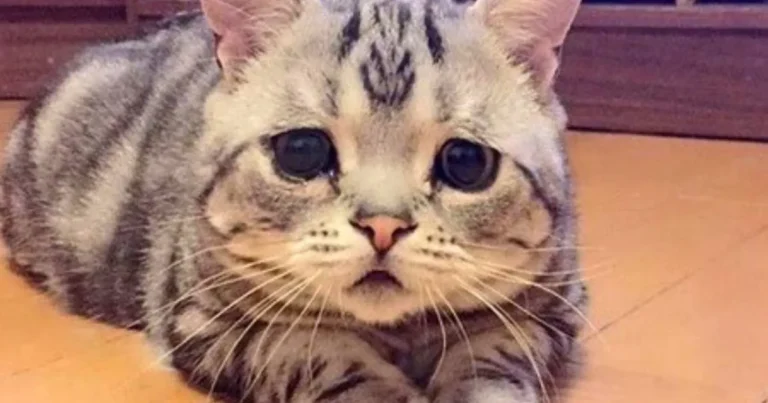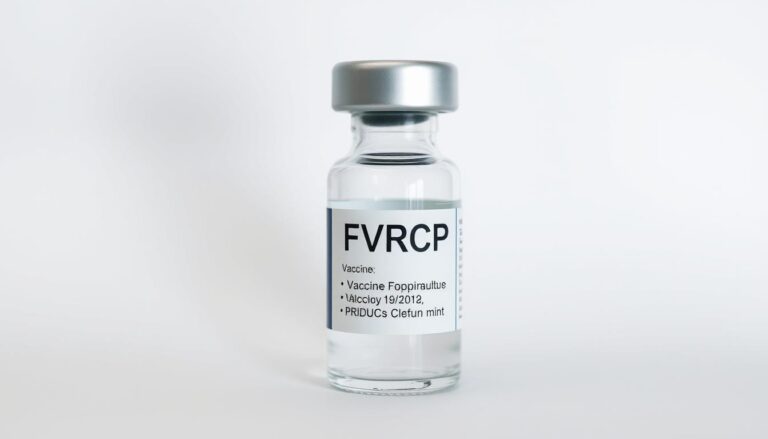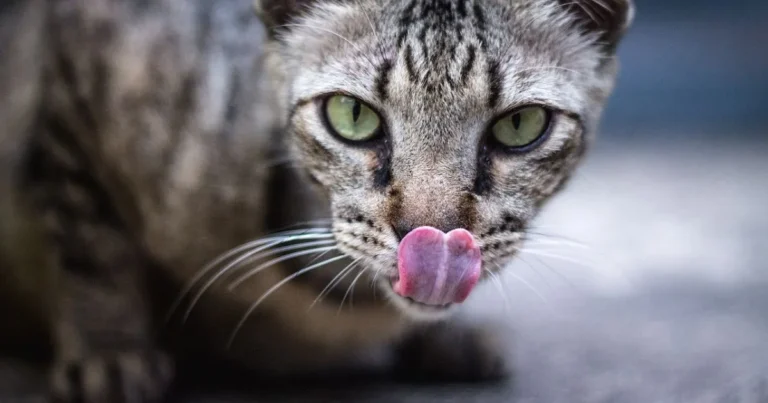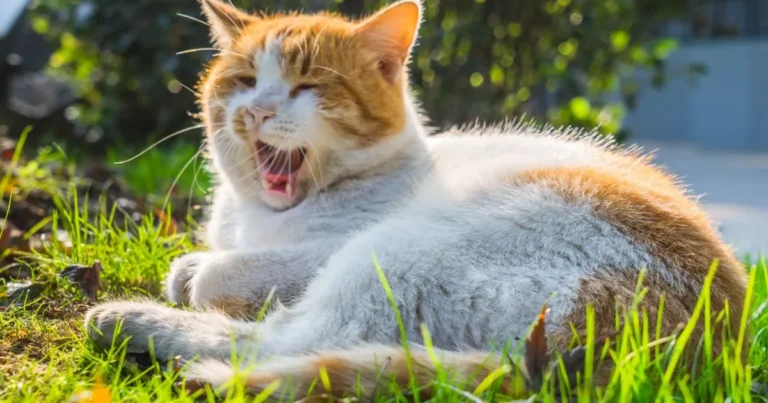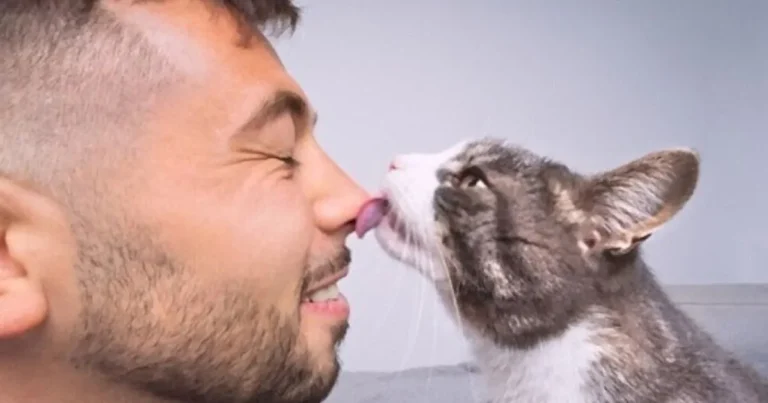Why Do Cats Lick You? Understanding Feline Affection
Table of Contents
Why Do Cats Lick You?
Ever wonder why your furry friend gives you wet, sandpaper-like kisses? Learning why cats lick you opens up a world of feline communication and emotional bonding. Each lick from your cat sends a message about their feelings and bond with you.
When your cat licks you, it’s more than a simple act. It’s a way for them to show deep emotional connections. Whether you’re wondering “why is my cat licking me” or curious about their communication, this guide will enlighten you.
Why do cats lick you? It’s for affection, instinctual marking, stress relief, and social bonding. Each lick tells a story about your cat’s emotional state and how they see you as a trusted friend. Understanding these signals can strengthen your bond with your cat.
Cats communicate through touch and taste in ways that might seem mysterious to humans. Their rough tongues are not just for grooming but also for expressing emotions. As we explore this behavior, you’ll learn more about the complex world of feline communication.
The Science Behind Cat’s Rough Tongue
Ever wondered why your cat’s tongue feels like sandpaper when they lick you? The secret lies in the unique biological design of feline tongues. When you ask “why does my cat keep licking me,” understanding their tongue’s remarkable structure provides fascinating insights.
Cat tongues are extraordinary biological tools that serve multiple purposes beyond simple licking. Covered in specialized structures called papillae, these microscopic hooks make their tongue a multipurpose grooming instrument.
Understanding Papillae Structure
Papillae are tiny, backward-facing keratin barbs that create the rough texture of a cat’s tongue. These microscopic structures are designed with remarkable precision:
- Shaped like miniature curved hooks
- Made of hard keratin protein
- Angled perfectly for efficient cleaning
How Cats Use Their Tongue for Grooming
A cat’s tongue is essentially a built-in brush. When your cat keeps licking you, they’re demonstrating a grooming behavior ingrained in their nature. These papillae help cats:
- Remove dirt and debris from fur
- Distribute natural oils across their coat
- Regulate body temperature
- Stimulate blood circulation
The Evolution of Feline Tongues
Millions of years of evolution have refined cats’ tongues into precision cleaning tools. Wild cats and domestic felines share this remarkable adaptation, which helps them maintain hygiene and survival skills passed down through generations.
Why Do Cats Lick You: Natural Instincts Explained
Ever wondered why your cat licks you? It’s a way cats communicate with us. They use licking to show feelings and bond with their humans.
Understanding cat licking means looking at their instincts. Kittens lick their mothers to feel safe and clean. This behavior helps them feel close to their mom.
- Demonstrates affection and trust
- Mimics early maternal grooming behaviors
- Transfers familiar scent markers
- Communicates emotional connection
Cats have this behavior from their wild ancestors. In the wild, grooming shows who’s in charge and strengthens friendships. Your cat does the same with you.
| Licking Behavior | Meaning |
|---|---|
| Gentle Licking | Showing affection and trust |
| Persistent Licking | Seeking attention or comfort |
| Intense Licking | Potential stress or anxiety signal |
Every lick is a special way for your cat to talk to you. It shows their feelings and desire to be close to you.
Social Bonding Through Grooming Behavior
Cats are social animals with complex ways of communicating. When a cat licks you, it’s not just a simple action. It’s a meaningful way to connect and share emotions. Understanding this can help us see how cats bond with us.
Grooming is key in cat communication. In the wild and at home, cats use licking to connect with others. When a cat licks your face, it’s like they’re welcoming you into their family.
Mother-Kitten Relationship: The First Social Bond
The habit of cat licking starts with kittens. Mother cats groom their kittens to:
- Clean their fur
- Stimulate circulation
- Show affection
- Give comfort and security
Allogrooming: A Community Connection
Cats in groups practice allogrooming. They lick and groom each other. This helps:
- Set up social orders
- Lower stress
- Strengthen bonds
Building Trust Through Licking
When your cat licks you, it’s showing you’re part of their close circle. This is a big deal for cats. It means you’re trusted and loved.
“A cat’s lick is more than moisture—it’s a declaration of trust and affection.”
Marking Territory and Showing Ownership
When your cat licks you, it’s more than just showing love. It’s a way for them to claim you as their own. They’re saying, “This human is mine.”
Cats have a natural instinct to mark their territory. They use licking as a way to communicate closely with you. By doing so, they mark you with their scent, making you part of their group.
- Scent glands activate during licking
- Territorial markers are left behind
- Other animals receive a clear message
Understanding why your cat licks you reveals a deeper meaning. It’s not just affection but a complex way of communicating. This behavior comes from their ancient instincts.
| Territorial Marking Method | Purpose |
|---|---|
| Licking | Transferring personal scent |
| Cheek rubbing | Leaving pheromone markers |
| Scratching | Visual and scent marking |
Your cat’s licking shows a strong bond and protection towards you. It’s a quiet but powerful way of saying, “You’re my family, and I’m keeping you safe.”
Emotional Reasons Behind Cat Licking
Why does your cat keep licking you? It’s not just about physical needs. Licking is a way cats show their feelings, giving us a peek into their minds.
Stress and Anxiety Indicators
Is your cat licking you too much? It might mean they’re stressed or anxious. Cats lick themselves to calm down when they’re feeling overwhelmed. It’s their way of dealing with tough emotions.
- Repetitive licking might indicate psychological distress
- Environmental changes can trigger anxiety-related licking
- Sudden life disruptions may cause increased licking behavior
Comfort-Seeking Behavior
Cats lick to feel safe and connected. When they lick you, they’re trying to find comfort and security. It’s their way of saying, “I feel safe with you.”
| Licking Behavior | Emotional Meaning |
|---|---|
| Gentle, rhythmic licking | Seeking reassurance |
| Persistent licking | Expressing need for comfort |
| Sudden increase in licking | Potential anxiety signal |
Signs of Affection
Licking is also a sign of emotional bonding. When your cat licks you, they’re showing trust, love, and a strong bond. It’s a deep connection between you and your cat.
Understanding these emotional signs helps you connect with your cat on a deeper level. It strengthens your bond and lets you appreciate their unique way of communicating.
Attention-Seeking and Communication
Cats are experts at talking to us, and licking is a key way they get our attention. When your cat licks you, it’s not just a random thing. They use their tongues to tell you what they need or want.
So, why do cats lick you? It’s often a clever way to get your full attention. They might be telling you they’re hungry, want to play, or need some love.
- Requesting food or treats
- Wanting to play
- Seeking physical affection
- Indicating they want to be picked up
Understanding what your cat is trying to say through licking is important. Different licking styles can mean different things. A quick lick might be a hello, but a long, hard lick could mean they really need something.
| Licking Intensity | Potential Communication |
|---|---|
| Soft, Brief Licks | Social Greeting |
| Repeated, Intense Licking | Urgent Need or Stress |
| Gentle, Prolonged Licking | Seeking Comfort or Attention |
Watch your cat’s body language and the setting when they lick you. Context is key in understanding why cats lick you. By paying attention to these signs, you’ll get closer to your cat and meet their needs better.
When Cat Licking Becomes Excessive
Cat licking is usually a sign of love. But, sometimes it can be a problem. Knowing why your cat licks you too much can help find and fix issues.
Behavioral Red Flags
It’s important to know when cat licking is not normal. Look out for these signs:
- Constant, compulsive licking that interrupts daily activities
- Licking that seems anxious or stress-induced
- Excessive grooming that leads to skin irritation or hair loss
Health-Related Concerns
Medical issues can also cause excessive licking. Some possible health problems include:
- Skin allergies or dermatological problems
- Digestive system disorders
- Neurological conditions
- Nutritional deficiencies
If your cat’s licking doesn’t stop or seems odd, see a vet. They can find health problems and treat them.
Professional guidance is essential when your cat’s licking behavior becomes disruptive or seems abnormal.
Remember, normal licking is okay. But, if your cat’s behavior changes a lot, get help. This ensures your cat stays healthy and happy.
How to Respond to Your Cat’s Licking
Understanding what does it mean when my cat licks me helps you respond right. Cats talk through licking, and how you react can make their message stronger or change it.
- Gently redirect your cat’s attention with interactive toys
- Provide alternative bonding activities like petting or playing
- Use positive reinforcement techniques
- Create engaging environmental stimulation
Different licking situations need different answers. Here’s a guide to understand what does it mean when my cat licks me:
| Licking Behavior | Potential Meaning | Recommended Response |
|---|---|---|
| Gentle, brief licks | Affection and bonding | Reciprocate with gentle pets |
| Persistent, intense licking | Stress or anxiety | Create calm environment |
| Sudden increase in licking | Potential health issue | Consult veterinarian |
Remember, each cat is unique. Watch your cat’s body language and behavior when dealing with licking. Being patient and understanding is crucial for a strong bond with your cat.
Professional cat behaviorists suggest a consistent, gentle way to change any cat’s behavior.
If licking gets too much or worries you, get expert help. This ensures your cat’s health and happiness.
Professional Guidance and When to Seek Help
Understanding why your cat keeps licking you is key to a healthy bond. Sometimes, you might need a pro to help with this behavior.
When should you look for expert help for your cat’s licking? Watch for these signs:
- Excessive licking that disrupts daily activities
- Licking that shows stress or anxiety
- Potential skin irritation from licking
- Sudden changes in licking behavior
Vets can give deep insights into your cat’s licking. They’ll check for health issues that might cause it.
| Professional Resource | What They Can Help With |
|---|---|
| Veterinarian | Medical assessments, ruling out health issues |
| Animal Behaviorist | Analyzing psychological triggers for licking |
| Feline Nutritionist | Evaluating diet-related behavior modifications |
If trying other methods doesn’t work, a pro can help. Early help stops long-term problems.
Every cat is different. Experts can give you tailored advice for your cat’s licking.
Conclusion
Understanding why cats lick us shows a complex language of communication. When your cat licks your face or hand, they’re doing more than showing love. They’re marking territory, expressing emotions, and bonding with you.
Cat licking is tied to their instincts and personalities. Some cats lick to show love, while others do it to cope with stress. Knowing your cat’s unique way of communicating is key.
Vets say most licking is normal, but too much could mean health or mental issues. Paying attention to how often and in what context they lick helps you understand them better. This strengthens the bond between you and your cat.
Being aware of why cats lick us can turn simple gestures into deep connections. See these moments as a peek into your cat’s emotional world. Each lick holds a special meaning.
FAQ
Why does my cat lick me so much?
Cats lick their humans for many reasons. They show affection, mark territory, seek attention, and bond socially. It’s a complex behavior rooted in their natural instincts.
Is it normal for cats to lick their owners’ faces?
Yes, it’s normal for cats to lick their owners’ faces. It shows trust and social bonding. In cat communities, grooming the face is a sign of intimacy and acceptance.
What does it mean when a cat licks you repeatedly?
Repeated licking can mean several things. Your cat might be showing affection, marking you with their scent, seeking attention, or trying to communicate a need like hunger or play.
Why does my cat’s tongue feel so rough when they lick me?
A cat’s tongue feels rough because of papillae. These tiny barbs help with grooming, eating, and temperature regulation. They evolved to clean fur and remove parasites efficiently.
Can excessive licking be a sign of a health problem?
Yes, excessive licking can be a sign of health or behavioral issues. It could be stress, anxiety, skin irritations, or compulsive disorders. If the licking becomes obsessive or changes suddenly, see a vet.
How should I respond when my cat licks me?
Respond positively by understanding why they lick you. If it’s too much, gently redirect their attention or offer other ways to interact. Avoid punishment, as it can harm your bond.
Do all cats lick their owners?
Not all cats lick their owners the same way. Each cat is unique, with different personalities and experiences. Licking behavior varies based on temperament, socialization, and past experiences.
Is cat licking a form of grooming?
Yes, licking is a primary grooming behavior for cats. When they lick you, they’re extending their social grooming to include you. It’s a way of making you part of their social group.


